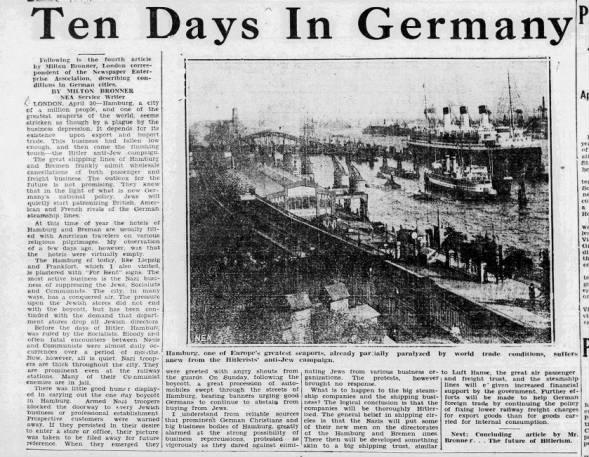- Headline
-
Ten Days In Germany
- Publication Date
- Thursday, April 20, 1933
- Historical Event
-
Nazis Boycott Jewish Businesses
This database includes 4,061 articles about this event - Article Type
- Newspaper
- Page Section and Number
- 10
- Author/Byline
- Milton Bronner (NEA)
- Article Text
- Following is the fourth article by Milton Bronner, London correspondent of the Newspaper Enterprise Association, describing conditions in German cities.
LONDON, April 20—Hamburg, a city of a million people, and one of the greatest seaports of the world, seems stricken as though by a plague by the business depression. It depends for its existence upon export and import trade. This business had fallen low enough, and then came the finishing touch—the Hitler anti-Jew campaign.
The great shipping lines of Hamburg and Bremen frankly admit wholesale cancellations of both passenger and freight business. The outlook for the future is not promising. They know that in the light of what is now Germany's national policy, Jews will quietly start patronizing British, American and French rivals of the German steamship lines.
At this time of year the hotels of Hamburg and Breman are usually filled with American travelers on various religious pilgrimages My observation of a few days ago, however, was that the hotels were virtually empty.
The Hamburg of today, like Liepzig[sic] and Frankfort[sic], which I also visited, is plastered with "For Rent" signs. The most active business is the Nazi business of suppressing the Jews, Socialists and Communists. The city, in many ways, has a conquered air. The pressure upon the Jewish stores did not end with the boycott, but has been continued with the demand that department stores drop all Jewish directors.
Before the days of Hitler Hamburg was ruled by the Socialists. Bloody and often fatal encounters between Nazis and Communists were almost daily occurrences over a period of months. Now, however, all is quiet. Nazi troopers are thick throughout the city. They are prominent even at the railway stations. Many of their Communist enemies are in Jail.
There was little good humor displayed in carying out the one day boycott in Hamburg. Armed Nazi troopers blocked the doorway to every Jewish business or professional establishment. Prospective customers were warned away. If they persisted in their desire to enter a store or office, their picture was taken to be filed away for future reference. When they emerged they
[Image of shipyard in Hamburg]
Hamburg, one of Europe's greatest seaports, already partially paralyzed by world trade conditions, suffers anew from the Hitlerists' anti-Jew campaign.
were greeted with angry shouts from the guards. On Sunday, following the boycott, a great procession of automobiles swept through the streets of Hamburg, bearing banners urging good Germans to continue to abstain from buying from Jews.
I understand from reliable sources that prominent German Christians and big business bodies of Hamburg, greatly alarmed at the strong possibility of business repercussions, protested as vigorously as they dared against eliminating Jews from various business organlzatlons. The protests, however brought no response.
What is to happen to the big steamship companies and the shipping business? The logical conclusion is that the companies will be thoroughly Hltlerized. The general belief in shipping circles is that the Nazis will put some of their new men on the directorates of the Hamburg and Bremen lines. There then will be developed something akin to a big shipping trust, similar to Luft Hanse, the great air passenger and freight trust, and the steamship lines will e[sic] given increased financial support by the government. Further efforts will be made to help German foreign trade by continuing the policy of fixing lower railway freight charges for export goods than for goods carried for internal consumption.
—
Next: Concluding article by Mr. Bronner. . . The future of Hitlerism. - History Unfolded Contributor
- Patricia P.
- Location of Research
- Newspapers.com (https://www.newspapers.com)
Learn More about this Historical Event: Nazis Boycott Jewish Businesses
- The Boycott of Jewish Businesses (The Holocaust: A Learning Site for Students)
- Boycott of Jewish Businesses (Encyclopedia Article)
Bibliography
Friedländer, Saul. Nazi Germany and the Jews. New York: HarperCollins, 1997.
Schleunes, Karl A. The Twisted Road to Auschwitz: Nazi Policy Toward German Jews, 1933–1939. Urbana: University of Illinois Press, 1970.
All articles about this event
Download the full newspaper page
See full image on newspapers.com
Newspaper images provided by Newspapers.com
